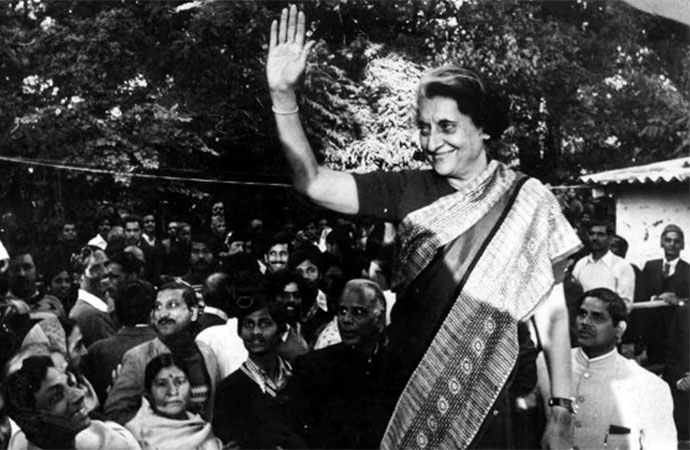Politics

Indira Gandhi. Photo: Courtesy
The state of emergency imposed by Prime Minister Indira Gandhi 50 years ago showed how the erosion of freedom often happens – subtly at first, with the chipping away of seemingly minor liberties in the name of virtuous-sounding causes. It should thus serve as a potent warning: democratic stalwarts must be eternally vigilant.
On June 25, 1975, India awoke to a new reality. The airwaves crackled not with the usual government pronouncements, but with a chilling decree: a state of emergency had been declared. For 21 long months, fundamental rights were suspended; the press was muzzled; and political dissent was brutally suppressed. The world's largest democracy held its breath, as the very essence of its constitutional promise - liberty, equality, fraternity - was severely tested. Fifty years on, the period remains etched in Indians' collective memory as the "Emergency."
I was in India when the Emergency was declared, though I soon left for graduate studies in the United States and observed the rest of it from afar. At its onset, I was struck by the profound sense of disquiet. The vibrant cacophony of Indian public life, so accustomed to vigorous debate and free expression, had been replaced by an eerie silence. Prime Minister Indira Gandhi insisted that the draconian measures were necessary: only a state of emergency could combat internal disorder and external threats, and bring discipline and efficiency to a chaotic country.
The judiciary buckled under immense pressure to back the move, with the Supreme Court even upholding the suspension of habeas corpus and citizens' fundamental right to liberty. Journalists, activists, and opposition leaders found themselves behind bars. The broad constitutional transgressions enabled a horrifying litany of human-rights abuses. Torture in detention and extrajudicial killings - though less publicized at the time - were dark realities for those who dared to defy the regime.
In fact, the quest for "discipline" and "order" often translated into unspeakable cruelty, exemplified by the forced vasectomy campaigns led by Gandhi's son, Sanjay, and concentrated in poorer and rural areas, where coercion and violence were used to meet arbitrary targets. Slum demolitions, carried out with ruthless efficiency in urban centers like New Delhi, rendered thousands homeless, with little to no concern for their welfare.
These acts were later downplayed as unfortunate excesses. And some might point out that, in the Emergency's immediate aftermath, there was a fleeting sense of order imposed, a temporary respite from the unruliness of democratic politics. But the violence was a direct consequence of a system where unchecked power had become tyrannical, and whatever order the Emergency delivered came at a very high price: the soul of our republic.
The silencing of dissent, the curtailment of fundamental rights to assemble, write, and speak freely, and the blatant contempt for constitutional norms left an indelible scar on India's polity. Though the judiciary eventually found its spine, its initial faltering would not quickly be forgotten. And the period's "excesses" caused deep and lasting harm to countless lives, leaving a legacy of trauma and mistrust in affected communities - which they demonstrated by overwhelmingly voting Gandhi and her party out of power in the first free elections after the Emergency was lifted, in March 1977.
The 50th anniversary of the declaration of the Emergency - which comes at a time of deep polarization and challenges to democratic norms in many countries - is an occasion for historical reflection and introspection. The Emergency offered a vivid demonstration of how fragile democratic institutions can be, even in a country where they are ostensibly robust. It reminded us that a government can lose its moral compass and sense of accountability to the people it purports to serve. And it showed how the erosion of freedom often happens: subtly at first, with the chipping away of seemingly minor liberties in the name of virtuous-sounding causes, until "family planning" and "urban renewal" become forced sterilizations and arbitrary home demolitions.
The lessons of this experience are manifold and enduring. First, freedom of information and an independent press are of paramount importance. When the fourth estate is besieged, the public is deprived of the information it needs to hold political leaders accountable. That said, the cravenness of many media outlets in the face of intimidation remains inexcusable.
Second, democracies depend on an independent judiciary able and willing to serve as a bulwark against executive overreach. Judicial capitulation - even when temporary - can have severe and far-reaching consequences.
The third lesson - perhaps the most pertinent in our current political climate - is that an overweening executive, backed by a legislative majority, can pose a grave danger to democracy, especially when that executive is convinced of its own infallibility and impatient with the checks and balances that are essential to democratic systems. The Emergency was possible precisely because power was centralized to an unprecedented degree, and dissent was equated with disloyalty.
The India of today is not the India of 1975. We are a more confident, more prosperous, and, in many ways, a more robust democracy. Yet the lessons of the Emergency remain alarmingly relevant. The temptation to centralize power, to silence critics, and to bypass constitutional safeguards can emerge in many forms, often cloaked in the rhetoric of national interest or stability. In this sense, the Emergency should serve as a potent warning: democratic stalwarts must be eternally vigilant.
All of us - in India and around the world - who believe in democracy must ask ourselves: are we sufficiently attuned to the subtle erosion of democratic values? Could we recognize, let alone resist, the advent of strongman rule? Are we doing enough to protect the institutions, from the press to the judiciary to civil society, that safeguard our freedoms?
Let us not merely remember the Emergency as a dark chapter in India's history, but instead internalize its lessons. Let it be a constant reminder to people everywhere that democracy cannot be taken for granted; it is a precious inheritance that must be constantly nurtured and fiercely defended.
From Project Syndicate

























Leave a Comment
Recent Posts
Pedaling Through the Mangroves ...
The journey from the bustling streets of Barishal to the serene, emera ...
Why the Interim Government mus ...
Two weeks out from what is expected to be a red letter day in the figh ...
Doesn’t matter who thinks what about Bangladesh deci ..
The Other Lenin
US President Donald Trump said his administration
Govt moves to merge BIDA, BEZA, BEPZA, MIDA